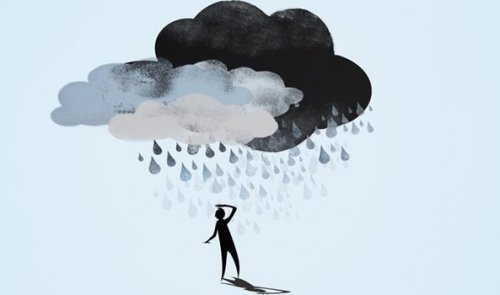How Are Self-Esteem and Depression Related?


Written and verified by the psychologist Valeria Sabater
Self-esteem and depression are very closely related. Although depression can be caused by more than one thing, clinical studies reveal that low self-esteem makes people more vulnerable to this condition. This is because not accepting ourselves can emotionally drain us.
Self-esteem are feelings that arise from the concept we have of ourselves. While that concept includes all the ideas and beliefs that define the mental image of what we are, self-esteem is a basic emotional element of a person’s well-being.
A low self-esteem makes us feel bad about ourselves. It disconnects us, brings us down, and makes us vulnerable to developing certain psychological disorders.
Thus, this is why psychologists and psychiatrists take into account this psychological dimension in order to understand depression.
However, in the Diagnostic and Statistical Manual of Mental Disorders, Fifth Edition (DSM-5) low self-esteem isn’t included in the diagnostic criteria for depression. However, there are other similar criteria such as “feelings of worthlessness”.
Personality psychology researchers have always showed interest in the relationship between self-esteem and depression. Their research basically stems from one important question: Is self-esteem a factor that promotes depression? Or does depression affect self-esteem? Let’s delve deeper into this.

Two models that explain how self-esteem and depression relate
Many times we wake up, take a shower, have breakfast, and go out without realizing we’re naked. This is because it doesn’t matter how covered up we are or the brand of our jeans and shirt if we face the world every day with a low self-esteem. Because through its cracks and weak armor, anything can get to us: abuse, fear, insecurity, negativity…
It’s clear, however, that depression has a very diffused and multifactorial origin. Also, there are endogenous causes that we can’t always control.
No one can deny that low self-esteem results in an inability to face and deal with simple problems. In fact, a person with low self-esteem usually sees the world through very dark glasses.
The only way to demonstrate a link between self-esteem and depression is through longitudinal studies. This is why the University of Basel published a very informative article about it that can answer our questions. Let’s talk about it.

The vulnerability model
According to the vulnerability model, there are people with a personality profile characterized by constant low self-esteem. This psychological pattern makes the person see life events in a negative way. In addition, the person also lacks the basic ability of resilience.
- They often promote a reality they must defend themselves from. They don’t trust this reality. In it, they’re the victim or a “supporting actor” instead of the protagonist of their own story. They don’t realize they deserve and need opportunities and positive changes to overcome negative situations.
- Researchers observed that, in many cases, people with low self-esteem didn’t try to reject their negative concept of themselves. Instead, they tried to verify them by paying more attention to the negative comments from the people around them.
The scar model
This is the opposite of the vulnerability model. According to the study we mentioned before, depression itself is often the cause of low self-esteem. All those desperate, negative, and exhausting feelings that orbit the depressed mind directly affect self-esteem.
Conclusion
So which model is correct? Is it the vulnerability model or the scar model? The American Psychological Association (APA) knows the answer: weak self-esteem is yet another risk factor in the development of psychological disorders, depression being among them.
In fact, researchers claimed that self-esteem and depression are so closely related that the priority should be developing adequate prevention strategies in teenagers. This is because more and more teenagers are being diagnosed with depression year after year.
The vulnerability model is therefore the one we should all be most aware of. In some way, it also fits with Beck’s cognitive triad about people at a higher risk of suffering from depression. His theory states that these people have a negative perspective of the world, don’t trust the future, and feel worthless.

Self-esteem and depression have a strong relationship we can’t overlook. Thus, we should keep the garden of our self-esteem strong, bright, and beautiful in every way.
Self-esteem and depression are very closely related. Although depression can be caused by more than one thing, clinical studies reveal that low self-esteem makes people more vulnerable to this condition. This is because not accepting ourselves can emotionally drain us.
Self-esteem are feelings that arise from the concept we have of ourselves. While that concept includes all the ideas and beliefs that define the mental image of what we are, self-esteem is a basic emotional element of a person’s well-being.
A low self-esteem makes us feel bad about ourselves. It disconnects us, brings us down, and makes us vulnerable to developing certain psychological disorders.
Thus, this is why psychologists and psychiatrists take into account this psychological dimension in order to understand depression.
However, in the Diagnostic and Statistical Manual of Mental Disorders, Fifth Edition (DSM-5) low self-esteem isn’t included in the diagnostic criteria for depression. However, there are other similar criteria such as “feelings of worthlessness”.
Personality psychology researchers have always showed interest in the relationship between self-esteem and depression. Their research basically stems from one important question: Is self-esteem a factor that promotes depression? Or does depression affect self-esteem? Let’s delve deeper into this.

Two models that explain how self-esteem and depression relate
Many times we wake up, take a shower, have breakfast, and go out without realizing we’re naked. This is because it doesn’t matter how covered up we are or the brand of our jeans and shirt if we face the world every day with a low self-esteem. Because through its cracks and weak armor, anything can get to us: abuse, fear, insecurity, negativity…
It’s clear, however, that depression has a very diffused and multifactorial origin. Also, there are endogenous causes that we can’t always control.
No one can deny that low self-esteem results in an inability to face and deal with simple problems. In fact, a person with low self-esteem usually sees the world through very dark glasses.
The only way to demonstrate a link between self-esteem and depression is through longitudinal studies. This is why the University of Basel published a very informative article about it that can answer our questions. Let’s talk about it.

The vulnerability model
According to the vulnerability model, there are people with a personality profile characterized by constant low self-esteem. This psychological pattern makes the person see life events in a negative way. In addition, the person also lacks the basic ability of resilience.
- They often promote a reality they must defend themselves from. They don’t trust this reality. In it, they’re the victim or a “supporting actor” instead of the protagonist of their own story. They don’t realize they deserve and need opportunities and positive changes to overcome negative situations.
- Researchers observed that, in many cases, people with low self-esteem didn’t try to reject their negative concept of themselves. Instead, they tried to verify them by paying more attention to the negative comments from the people around them.
The scar model
This is the opposite of the vulnerability model. According to the study we mentioned before, depression itself is often the cause of low self-esteem. All those desperate, negative, and exhausting feelings that orbit the depressed mind directly affect self-esteem.
Conclusion
So which model is correct? Is it the vulnerability model or the scar model? The American Psychological Association (APA) knows the answer: weak self-esteem is yet another risk factor in the development of psychological disorders, depression being among them.
In fact, researchers claimed that self-esteem and depression are so closely related that the priority should be developing adequate prevention strategies in teenagers. This is because more and more teenagers are being diagnosed with depression year after year.
The vulnerability model is therefore the one we should all be most aware of. In some way, it also fits with Beck’s cognitive triad about people at a higher risk of suffering from depression. His theory states that these people have a negative perspective of the world, don’t trust the future, and feel worthless.

Self-esteem and depression have a strong relationship we can’t overlook. Thus, we should keep the garden of our self-esteem strong, bright, and beautiful in every way.
This text is provided for informational purposes only and does not replace consultation with a professional. If in doubt, consult your specialist.







